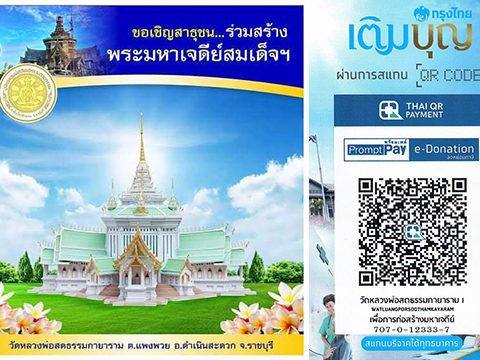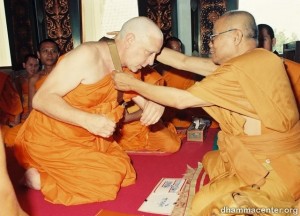
The Benefits of Developing Wisdom
There are hundreds of benefits gained from developing wisdom through meditation. A brief summary of these benefits is:
- 1. The Destruction of Defilements,
- 2. Attaining the Taste of the Noble Fruits,
- 3. The Ability to Enter the Attainment of Cessation,
- 4. Attaining Noble Qualities such as Being Worthy of Gifts.
The Destruction of Defilements
Destruction of defilements is gained from discerning mind and matter as they really are. Knowledge of mentality and materiality begin with the benefits of developing worldly wisdom, but destruction of deep defilements and fetters such as False Self Concept (sakkayadihi) as well as attainment of the Path are the benefits of developing Supra-mundane wisdom.
Here are some similes showing how insight wisdom (vipassanapañña) is able to destroy defilements:
- 1. Like a lightning bolt that strikes a rock breaking it into fragments,
- 2. Like a fi re that consumes the forest,
- 3. Like a ray of sunlight that destroys darkness.
The benefits of insight wisdom can be achieved and enjoyed only by the one who has developed them.
Attaining the taste of the Noble Fruits
Attaining the taste of the Noble Fruits is also a benefit of developing insight wisdom. This is gained at two stages: When Noble Path consciousness arises and when Noble Fruit consciousness or cessation occurs. The Noble Fruit is the highest benefit of the Path. It has the eternal dhamma of Nibbana (Nirvana) as its object. It is a benefit of the highest and purest happiness, like tasting honey mixed with elixir.
The Ability to Enter Attainment of Cessation
Lord Buddha said:
Due to the wise causing Noble Wisdom [Noble Path and Fruit] to arise [through concentration and insight meditation], one enters the most refined attainment (samapatti) that the Noble Ones taste. This is considered reaching Nibbana (Nirvana) in this world. Thus, the Lord Buddha states that one who enters ultimate Cessation (nirodhasamapatti), does so as the Fruit of Wisdom [wisdom development] in the Noble Paths.
Attaining Noble Qualities Such As Being Worthy of Gifts
The benefits of developing wisdom include not only the ability to attain cessation but also developing the qualities of the Noble Ones such as worthy of gifts. Generally, those who have developed wisdom are worthy of gifts (āhuneyya), hospitality (pahuneyya), offerings (dakkhineyya), reverential salutation (añjalikaraniya) of world beings and angels (deva) and are also an incomparable field of merit and virtue for the world. Specifically, there are four types of Noble Ones who have developed Supra-mundane wisdom.
THE BENEFITS OF DEVELOPING WISDOM
There are hundreds of benefits gained from developing wisdom through meditation. A brief summary of these benefits is:
- 1. The Destruction of Defilements,
- 2. Attaining the Taste of the Noble Fruits,
- 3. The Ability to Enter the Attainment of Cessation,
- 4. Attaining Noble Qualities such as Being Worthy of Gifts.1
The Destruction of Defilements
Destruction of defilements is gained from discerning mind and matter as they really are. Knowledge of mentality and materiality begin with the benefits of developing worldly wisdom, but destruction of deep defilements and fetters such as False Self Concept (sakkayadihi) as well as attainment of the Path are the benefits of developing Supra-mundane wisdom.
Here are some similes showing how insight wisdom (vipassanapañña) is able to destroy defilements:85
- 1. Like a lightning bolt that strikes a rock breaking it into fragments,
- 2. Like a fi re that consumes the forest,
- 3. Like a ray of sunlight that destroys darkness.
The benefits of insight wisdom can be achieved and enjoyed only by the one who has developed them.
Attaining the taste of the Noble Fruits
Attaining the taste of the Noble Fruits is also a benefit of developing insight wisdom. This is gained at two stages: When Noble Path consciousness arises and when Noble Fruit consciousness or cessation occurs. The Noble Fruit is the highest benefit of the Path. It has the eternal dhamma of Nibbana (Nirvana) as its object. It is a benefit of the highest and purest happiness, like tasting honey mixed with elixir.
The Ability to Enter Attainment of Cessation
Lord Buddha said:
Due to the wise causing Noble Wisdom [Noble Path and Fruit] to arise [through concentration and insight meditation]
, one enters the most refined attainment (samapatti) that the Noble Ones taste. This is considered reaching Nibbana (Nirvana) in this world. Thus, the Lord Buddha states that one who enters ultimate Cessation (nirodhasamapatti), does so as the Fruit of Wisdom [wisdom development] in the Noble Paths.
Attaining Noble Qualities Such As Being Worthy of Gifts
The benefits of developing wisdom include not only the ability to attain cessation but also developing the qualities of the Noble Ones such as worthy of gifts. Generally, those who have developed wisdom are worthy of gifts
(ā huneyya), hospitality (pahuneyya), offerings (dakkhineyya), reverential salutation (añjalikaraniya) of world beings and angels (deva) and are also an incomparable field of merit and virtue for the world. Specifically, there are four types of Noble Ones who have developed Supra-mundane wisdom.
Stream-Enterer (Sotapanna)
A Stream-Enterer (sotapanna) is one who has developed First Path Wisdom and abandoned the fi rst three Fetters or bondages (sanyojana)
note. He has entered the stream to Nibbana and is not reborn into the lower realms, he is certain to become enlightened in the future.
Note: The three lower Fetters are personality-view (sakkāyadihi) (the view that clings to mind and matter as self), doubt (vicikiccha) (in the qualities of the Triple Gems or the path leading to the cessation of suffering), and clinging to precepts and vows (silabbataparamasa).
As Lord Buddha states (Anguttara-nikaya 20/280-283/415-419):
Here, monks, a monk in this dispensation is one fully accomplished in virtue but only moderately accomplished in concentration and wisdom. He infringes some of the lesser and minor training rules and then rehabilitates himself. Why is that?
Because, monks, it is not said to be impossible for him to attain Supra-mundane dhamma.
Regarding training rules that are fundamental to the holy life and in conformity with the holy life, his virtue is stable and steady. He trains himself in the training rules that he has undertaken. With the utter destruction of three Fetters he becomes a Stream-enterer, no longer subject to rebirth in a lower world, fixed in destiny, with enlightenment as his destination.
Once-Returner (Sakadagami)
The Once-returner (sakadagami) is one who has developed Second Path Wisdom (dutiya-maggapañña), abandoned the three lower Fetters and permanently weakened greed, hatred and delusion. The Once-returner will be reborn in this world only once before attaining Nibbana. As Lord Buddha states (415-419):
Here, monks, a monk in this dispensation is one fully accomplished in virtue but only moderately accomplished in concentration and wisdom. He infringes some of the lesser and minor training rules and then rehabilitates himself. Why is that?
Because, monks, it is not said to be impossible for him to attain Supra-mundane dhamma.
Regarding training rules that are fundamental to the holy life and in conformity with the holy life, his virtue is stable and steady. He trains himself in the training rules that he has undertaken. With the utter destruction of the fi rst three Fetters and the attenuation of greed, hatred and delusion he becomes a once-returner. He comes back to this world only once more and then makes an end to suffering.
Non-Returner (Anagami)
The Non-Returner (anagami) is one who has developed Third Path Wisdom (tatiya-maggapañña) and abandoned two more Fetters: sensual lust [desire]
and repulsion [aversion]. The Non-Returner will not be reborn in this world. He will be reborn in the Pure Abodes in the Brahman world until attaining Nibbāna. As Lord Buddha states (415-419):
Here, monks, a monk in this dispensation is one fully accomplished in virtue, but only moderately accomplished in concentration and wisdom. He infringes some of the lesser and minor training rules and then rehabilitates himself. Why is that?
Because, monks, it is not said to be impossible for him to attain the Supra-mundane dhamma.
But regarding training rules that are fundamental to the holy life and in conformity with the holy life, his virtue is stable and steady. He trains himself in the training rules he has undertaken. With the utter destruction of the five lower Fettersnote he becomes a Non-returner, due to be reborn spontaneously and there attain final Nibbana, without ever returning to this world.
Note: The five lower fetters are personality-view (sakkayadihi), doubt (vicikiccha), clinging to precept and vows (sīlabbataparamasa), sensual lust (kamaraga), and repulsion (patigha).
A Worthy One (Arahant)
A Worthy One is one who has developed Fourth Path Wisdom and abandoned the last fi ve higher Fetters of attachment to Pure Form Realms, attachment to Formless Realms, Conceit, Restlessness and Ignorancenote.
Note: The five higher fetters are attachment to realms of form (rupa-raga), attachment to formless realms (arupa-raga), conceit (mana), restlessness (uddhacca) and ignorance (avijja).
The Arahant is far from defilements and has broken kamma (karma) and the cycle of rebirths. He is said to have disentangled all bondages during attainment of the Noble Path and to have completely disentangle them upon attainment of the Noble Fruit. He or she is worthy of veneration and respect of all people and is classed as the highest Noble Person in Buddhism. As Lord Buddha states (415-419):
Here, monks, a monk in this dispensation is one fully accomplished in virtue but only as yet moderately accomplished in concentration and wisdom.
He infringes some of the lesser and minor training rules and then rehabilitates himself. Why is that?
Because, monks, it is not said to be impossible for him to attain Supra-mundane dhamma.
As to those training rules that are fundamental to the holy life and in conformity with the holy life, his virtue is stable and steady. He trains himself in the training rules that he has undertaken.
With the utter destruction of mental intoxicants (asava), in this very life, he enters and dwells in the spotlessly pure liberation of mind, liberated by wisdom, having realized it for himself by direct knowledge.
As has been mentioned, the development of Noble Wisdom has many benefits; therefore, the wise person should strive to develop this Noble Wisdom. As Lord Buddha stated with the Dhamma principles of sila or morality, samadhi or concentration and pañña or wisdom (Samyutta-nikaya 15/61/20):
A competent monk with the diligence and wisdom to cultivate himself who is firmly established in morality (sila) and development of mind (citta) and insight (pañña) meditation is able to slash through this thick underbrush [of passion].








 ไลน์ "@wlps" เพื่อรับข่าวสารจากทางวัด
ไลน์ "@wlps" เพื่อรับข่าวสารจากทางวัด

